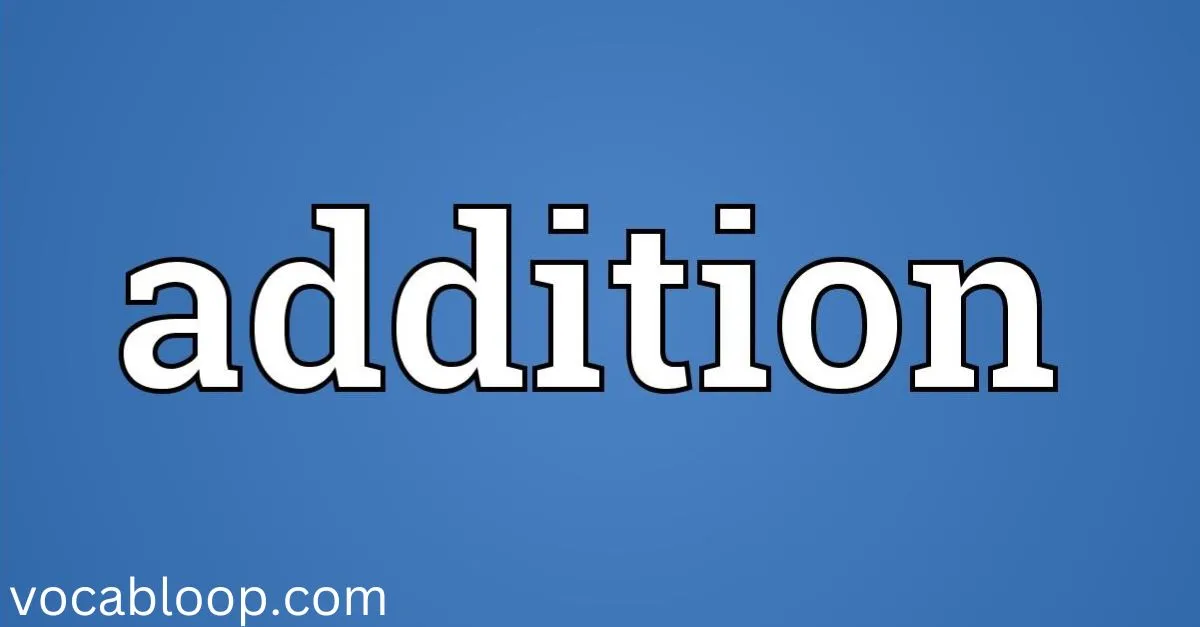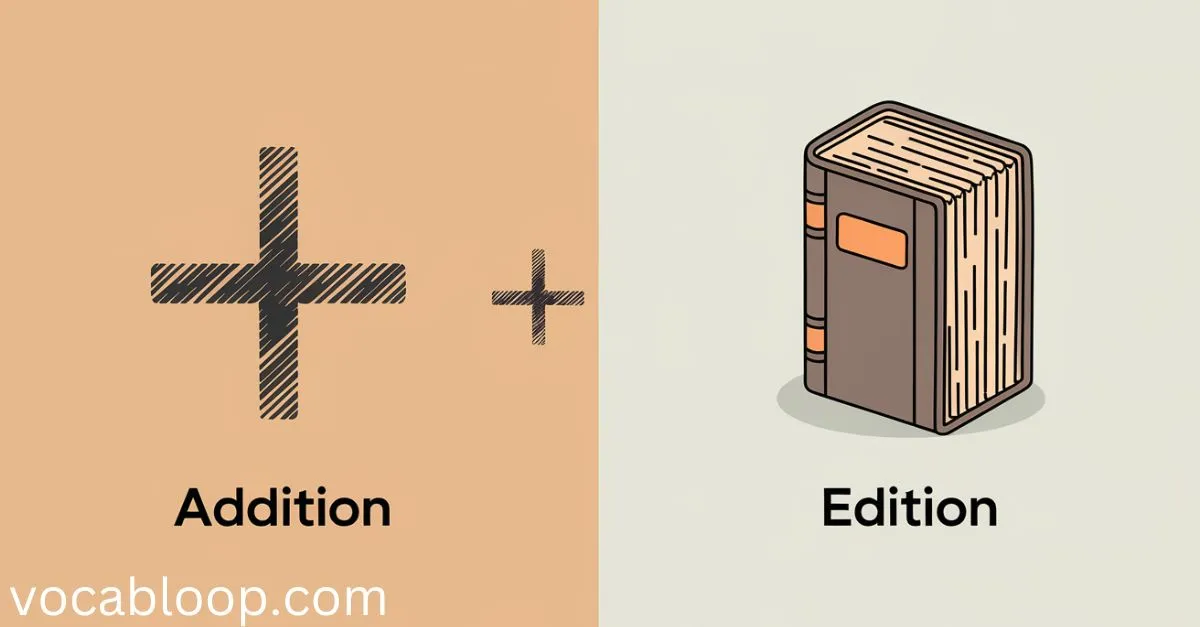The English language can be tricky, especially with words that look and sound similar. One common confusion is between addition vs edition. These words often trip people up because of their similar pronunciation and spelling. But their meanings are entirely different. Understanding the distinction helps improve your grammatical clarity and ensures your writing is precise.
This article explores the difference between addition and edition, their definitions, uses in mathematical contexts and published work, and how to avoid mixing them up. Whether you’re studying English or improving your writing assistance skills, this guide offers everything you need to know about these commonly confused words.
What is Confusion Addition vs Edition?

The confusion around addition vs edition arises mainly because of their phonetic similarity. Both words have a rhythmic “dition” sound, leading to frequent mix-ups in spelling and usage. However, they belong to entirely separate contexts.
While “addition” is often associated with math usage, “edition” refers to versions of published work like books or software. This distinction becomes clear when we look at their meanings, origins, and applications. Understanding these terms can help you write with clarity in language and avoid word differentiation issues.
What is Addition?

Addition is a basic mathematical operation used to combine two or more numbers or quantities into a single total. Represented by the “+” symbol, it is fundamental in arithmetic and everyday calculations. For example, adding 3 and 5 gives 8 (3 + 5 = 8). The numbers being added are called addends, and the result is called the sum.
Addition is commutative, meaning the order of addends doesn’t affect the sum (e.g., 3 + 5 = 5 + 3). It is widely applied in counting, measurements, and problem-solving, forming the foundation for more advanced mathematical concepts and operations.
Is the Word Addition Correct?
Yes, “addition” is a valid word in the English language. It is widely used in mathematical contexts and everyday conversation to describe something that has been added.
The word comes from the Latin root additio, meaning “to add.” Its modern meaning reflects this origin clearly.
Definition
The word “addition” refers to the act of adding or joining something to something else. It can mean the mathematical process of combining numbers or the inclusion of something new to an existing set.
Meaning
In math problems, “addition” is one of the four basic arithmetic operations. For instance, adding 3 and 5 gives a total of 8. Beyond math, the term describes the process of including an extra element, such as a room being added to a house or a new feature in software. This wide usage makes “addition” an essential part of the English vocabulary.
Usage
“Addition” is common in both academic and conversational English. In math, it is central to solving problems. Outside math, it is used in contexts like, “The latest additions to our team are excellent!” This shows how the word applies to diverse situations, combining linguistic rules with practicality.
What is an Edition?

An edition refers to a specific version or release of a publication, product, or work, often distinguished by updates, revisions, or unique features. In publishing, it denotes a particular print run or version of a book, magazine, or newspaper, such as a “first edition” or “revised edition.”
Outside of publishing, “edition” can describe special releases of items, like limited-edition collectibles, software versions, or exclusive product variations. For instance, a “collector’s edition” may include bonus features or enhancements. The term helps identify differences in content, presentation, or distribution, ensuring clarity for consumers or audiences about the version they are engaging with.
Is the Edition Word Correct?
Absolutely. The word “edition” is correct and mainly used to describe a specific version of something, often in the context of books, magazines, or software. It comes from the Latin editio, meaning “to publish.”
Definition
“Edition” refers to a particular form or release of a published work. It can mean a reprint of a book, a new version of software, or even special collections like limited editions of art.
Meaning
An “edition” highlights a specific version that has been revised or updated. For example, the first edition of a book might include errors corrected in subsequent editions. This term is essential for identifying changes in text revisions and other work editions.
Usage
In practical contexts, “edition” appears in publishing and digital media. For example, “This is the 10th edition of the textbook.” It provides clarity when discussing document versions or distinguishing between unique releases.
Quick Summary
| Term | Definition | Usage Context | Example |
| Addition | Act of adding or including something | Math, inclusion in a group | “He made an addition to his team.” |
| Edition | A particular version of a published work | Books, software, media | “This is the second edition of the novel.” |
Addition vs Edition as Parts of Speech
The words “addition” and “edition” are nouns but serve different purposes. “Addition” typically refers to including something new or the process of adding, as in math or expanding a group, e.g., “The addition of a new member improved the team.” In contrast, “edition” denotes a specific version or release of a product, often books or media, e.g., “The first edition of the novel became a bestseller.”
Understanding their unique contexts helps avoid confusion. Clear grammar and precise word choice are vital for effective communication, ensuring readers or listeners grasp the intended meaning without ambiguity or misunderstanding.
Pronunciation of Addition vs Edition

The words “addition” and “edition” have subtle pronunciation differences. “Addition” is pronounced /əˈdɪʃ.ən/, with the stress on the first syllable, while “edition” is pronounced /ɪˈdɪʃ.ən/, emphasizing the second syllable. These stress patterns are crucial for accurate pronunciation and avoiding confusion.
For example, “addition” in a sentence like “The addition of new features is beneficial” requires clear enunciation to convey inclusion. Similarly, “edition” in “The special edition of the magazine sold out quickly” highlights a specific version. Practicing these nuances in speech enhances clarity, ensuring effective communication, especially in formal or educational settings.
Which One is More Acceptable: Addition vs Edition?
Both “addition” and “edition” are valid nouns, but their usage depends on context. “Addition” is commonly used in mathematical or inclusion-related situations, e.g., “The addition of two numbers yields a sum.” On the other hand, “edition” refers to a specific version of published material, such as books or magazines, e.g.
“The first edition of the book is rare.” Understanding these distinctions ensures accurate language use, especially in writing. Choosing the correct term based on context enhances clarity and professionalism, preventing misunderstandings in communication.
Addition in British English and American English
The term “addition” is used consistently in both British and American English, referring to mathematical operations or the act of adding something. Its meaning remains universal, ensuring clarity across different English-speaking regions.
For example, “The addition of two numbers equals their sum” applies universally. This consistency makes “addition” a straightforward term, free from regional variations, making it easily understood in both spoken and written communication.
Edition in British English and American English
The word “edition” is used identically in both British and American English, maintaining the same meaning across contexts. Whether discussing a “limited edition” in the UK or a “first edition” in the US, the term consistently refers to a specific version or release of a publication or product.
This uniformity ensures clarity and ease in language comparisons, making “edition” a reliable and universally understood term in English communication.
Common Mistakes: How to Avoid Them
A common mistake is confusing “addition” with “edition.” To avoid this, pay attention to context. Use “addition” when referring to mathematical operations or the act of adding something, e.g., “The addition of two numbers results in a sum.” For books, software, or other releases, “edition” is the correct term, e.g., “The latest edition includes new features.”
These distinctions are straightforward, but overlooking them can lead to errors. Simple checks and an understanding of their specific uses ensure precise communication, enhancing clarity in both writing and speech.
Trick to Remember the Difference: Addition vs Edition

An easy trick to differentiate between “addition” and “edition”: Think “A for adding” in “addition” to remember its use in mathematical operations or inclusion, e.g., “The addition of a new member strengthened the team.” For “edition,” associate “E for editing” to recall its connection to specific versions of books, software, or media, e.g.,
“The second edition of the book includes updates.” This simple association aligns with their meanings, making it easier to choose the right word and avoid confusion in both writing and speech.
Origins of Addition vs Edition
The word “addition” originates from the Latin additio, meaning “to add.” Initially used to describe the process of joining or combining, it evolved into modern English as a term commonly associated with mathematical operations or the act of including something new. Its meaning has remained consistent across centuries, emphasizing the idea of increase or inclusion.Conversely, “edition” derives from the Latin editio, which means “to publish.”
It was historically used to describe the act of bringing forth or issuing written works. As media and printing technologies advanced, “edition” expanded in usage, now referring to specific versions or releases of books, software, or other published materials.Understanding these origins highlights their distinct paths in the English language, offering insight into why “addition” relates to inclusion, while “edition” connects to the production of works.
Synonyms of Addition vs Edition
“Addition”:
- Increase
- Inclusion
- Increment
- Supplement
- Accession
- Attachment
- Annex
- Augmentation
- Complement
- Enlargement
“Edition”:
- Version
- Release
- Publication
- Issue
- Reprint
- Impression
- Installment
- Revision
- Copy
- Format
Sentences in Daily Usage of Addition vs Edition

“Addition”:
- The addition of spices enhanced the flavor.
- He proposed the addition of more safety measures.
- An addition to the plan was made yesterday.
- The addition of new rules created confusion.
- Their house gained an extra room as an addition.
- The addition of a glossary made the book user-friendly.
- She noticed the addition of several new features.
- The budget increase included the addition of new programs.
- The addition of a balcony improved the apartment.
- Adding salt as an addition balanced the dish’s taste.
“Edition”:
- The anniversary edition includes rare photos.
- This edition of the software has fewer bugs.
- The second edition was released last month.
- Collectors value the first edition highly.
- This limited edition bag is a bestseller.
- The paperback edition is cheaper than the hardcover.
- A revised edition of the report is being prepared.
- The deluxe edition comes with bonus content.
- The new edition of the magazine features exclusive interviews.
- Every edition of the textbook is thoroughly revised.
FAQs
What’s the difference between addition and edition?
Addition means adding something, often in math or inclusion. Edition refers to a specific version of a published work, like a book or magazine.
Can “edition” refer to math?
No, “edition” is not used in math. For math, use “addition.”
Why do we confuse these words?
Their similar spelling and sound cause confusion, but they have very different meanings.
How can I pronounce them?
“Addition” is /əˈdɪʃ.ən/, with stress on the first syllable. “Edition” is /ɪˈdɪʃ.ən/, with stress on the second syllable.
Where are they used?
“Addition” is used in math and when adding things. “Edition” is used for versions of books, magazines, or software.
Conclusion
Understanding the difference between addition vs edition is key to clear communication. Addition refers to the act of adding or including something, commonly seen in math usage or when expanding a group. On the other hand, edition focuses on a specific version of a published work, like a book, magazine, or software release.
The confusion arises due to their similar spelling and pronunciation, but their meanings are entirely distinct. Mastering these terms ensures better writing clarity and avoids common language mistakes in professional or everyday contexts.

Alex Hormozi is a seasoned blogger at Vocab Loop, known for his deep insights into language, vocabulary, and grammar. With years of experience in writing, Alex shares practical tips and effective strategies to help readers improve their linguistic skills and enhance their writing abilities.

